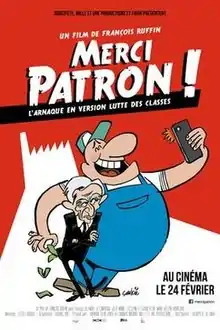Merci patron!
Merci patron! (Thank you, boss!) is a French documentary film directed by journalist François Ruffin. It was first screened in 2015 and was released nationally in France on 24 February 2016. The film is critical of the practice of outsourcing French jobs to foreign labour, and in particular it is critical of one of France's richest people, Bernard Arnault, chairman and CEO of the luxury goods conglomerate LVMH.[3][4] The style of the documentary has been compared to that of the American director Michael Moore.[3] The film's success has been cited as a factor in the rise of the Nuit debout movement.[5][6][7]
| Merci patron! | |
|---|---|
 Film poster | |
| Directed by | François Ruffin |
| Produced by | Edouard Mauriat Johanna Silva |
| Edited by | Cécile Dubois |
Production company | Mille et Unes production Les Quatre cents clous |
| Distributed by | Jour2fête |
Release date |
|
Running time | 83 minutes |
| Country | France |
| Language | French |
| Budget | €150,000[1] |
| Box office | $3.8 million[2] |
Synopsis
The film's stars are Jocelyn and Serge Klur, former workers at a factory that manufactured clothes for the luxury goods brand Kenzo, owned by LVMH. When the factory was moved to Poland, the couple found themselves unemployed, struggling with debt, and at risk of losing their house.
The director and left-wing activist François Ruffin sets out to help the couple, seeking to make Bernard Arnault, head of LVMH, pay compensation to the couple for "ruining their lives".[3]
Release
The film was a box office success. By the end of April 2016, the film had been seen by 315,183 cinemagoers in France.[1][8]
Bernard Arnault, when asked about the film by a shareholder at a meeting on 7 April 2016, responded, "LVMH is the illustration, the incarnation of the worst, according to these extreme leftist observers, of what the market economy produces."[9]
Awards
The film won the César for best documentary in 2017,[10] the same year Ruffin was elected to the lower house of the French parliament.[11]
References
- Mandelbaum, Jacques (6 April 2016). "« Merci patron ! » capitalise les entrées". Le Monde (in French). Retrieved 9 April 2016.
- https://www.boxofficemojo.com/movies/intl/?id=_fMERCIPATRON01&country=FR&wk=2016W18&id=_fMERCIPATRON01&p=.htm
- "Doc about workers' revenge on France's richest man becomes smash hit". France 24. 20 March 2016. Retrieved 9 April 2016.
- http://www.ikonlondonmagazine.com/lvmh-bernard-arnault-breaks-silence-in-hit-documentary-merci-patron/
- Bastié, Eugénie (7 April 2016). "Nuit debout : genèse d'un mouvement pas si spontané". Le Figaro (in French). Retrieved 9 April 2016.
- Chrisafis, Angelique (8 April 2016). "Nuit debout protesters occupy French cities in revolutionary call for change". The Guardian. Retrieved 9 April 2016.
- Besse Desmoulières, Raphaëlle (6 April 2016). "Nuit debout, histoire d'un ovni politique". Le Monde (in French). Retrieved 9 April 2016.
- "Merci patron!". JP's Box-Office.
- Carvajal, Doreen (12 April 2016). "Documentary Stirs French as Officials Weigh a Labor Overhaul". The New York Times. Retrieved 28 April 2016.
- "Huppert's 'Elle' wins big at politicised 'French Oscars', as Clooney blasts Trump". France24. 25 February 2017.
- Monique El-Faizy (19 June 2017). "Anti-establishment filmmaker Ruffin wins a seat in France's parliament". France24.